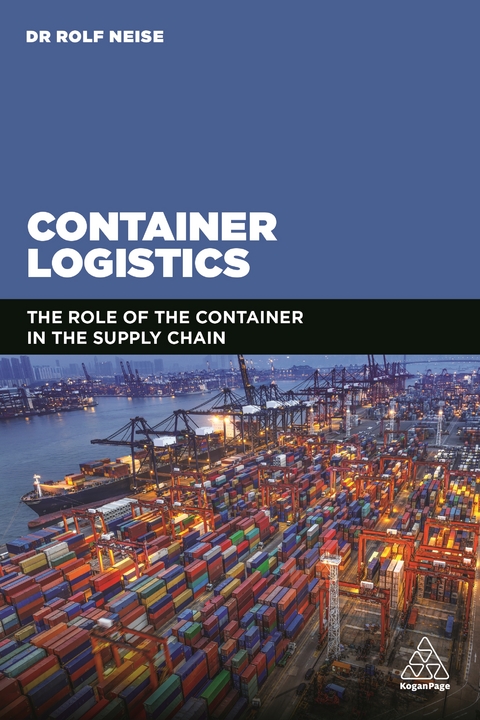
Container Logistics
Kogan Page Ltd (Verlag)
978-0-7494-8124-7 (ISBN)
Whilst the maritime container business has been studied in depth, the impact on shippers and how shippers deal with the given challenges has not been fully examined. Container Logistics bridges this gap and looks at the maritime business from a customer's perspective. The book examines the challenges, solutions and the latest developments in the container industry as well as the interaction between the different actors involved, such as freight forwarders, supply chain managers and shippers. Current hot topics from the supply chain and the maritime business perspective are included.
From the supply chain perspective, Container Logistics covers areas such as the purchase of transportation services from ocean carriers and transport management, to effective and efficient logistics execution. From the maritime business perspective, the book covers topics such as intermodal freight optimisation and hinterland transportation, and terminal and port optimisation. With the inclusion of clear examples of best practice and bona fide case studies, as well as invaluable contributions from an international team of experts, Container Logistics is an essential guide for supply chain managers and shippers, as well as academics and industry professionals working in the maritime business. Online supporting resources include images from the book and chapter summaries.
Dr Rolf Neise was the Global Head of Logistics Operations at BAT (British American Tobacco plc.) responsible for defining Logistics Excellence in the End-to-End Supply Chain. Prior to BAT, Dr Neise worked in several consultancies where he collected in-depth experience in reorganization and optimisation projects in different industries (automotive, telecommunication, chemistry) and companies across the world. He currently works as a lecturer at the International School of Management (ISM) in Germany and as a senior consultant supporting multinational companies in optimising their supply chain management and logistics structures.
Section - ONE: The Maritime Container Logistics Chain (MCLC);
Chapter - 01: Global Container Trade – The Past and the Future [Eyden Samunderu, International School of Management (ISM), Dortmund, Germany];
Chapter - 02: The Maritime Container Transportation Chain (MCTC) [Rolf Neise, International School of Management (ISM), Hamburg, Germany];
Chapter - 03: History and Usage of Containers in Logistics and Beyond [Hildegard Buschmann, Merle & Sheppard, Wuppertal, Germany / New Zealand];
Section - TWO: The Effective Management of the MCLC;
Chapter - 04: Empty Container Logistics – A Prospective Local Approach in the Port Of Hamburg [Marco Hofmann and Lillian Schmidt, Hamburg Port Authorities (HPA), Hamburg, Germany];
Chapter - 05: Port and Terminal Operations [Maik Ullrich and Michael Baumert, HPMPORT, Hamburg, Germany];
Chapter - 06: Multimodal Transport of Mining Equipment from Germany to Kazakhstan [Zhanat Abdugalimov, Anthony Beresford, and Stephen Pettit, Cardiff Business School, Cardiff, UK];
Chapter - 07: Cooperation and Collaboration between Shipping Lines [Alan Robertson, Webster Robertson Ltd, London, UK];
Chapter - 08: Collaboration in the Container Shipping Industry – New Technologies Enabling Collaboration between Shipping Lines and Terminals [Robert Inchausti, XVELA, Oakland, California, USA];
Section - THREE: The Integration of the MCLC into Global Supply Chain Management;
Chapter - 09: Global SCM and Resulting Shippers’ Requirements [Rolf Neise, International School of Management (ISM), Hamburg, Germany];
Chapter - 10: Advanced Benchmarking and Market Intelligence – A Key Instrument in Optimising Container Logistics Procurement [Björn Klippel, TIM Consult, Mannheim, Germany];
Chapter - 11: Formation of a Shipper Council to Improve Data Quality and Share Best Practices [Gregory Kefer, Infor Corporation, San Francisco, USA];
Chapter - 12: IoT Solutions in Maritime Logistics: Transports of Perishable Dairy Goods [Stefan Viehmann and Hans-Thoralf Bieber, Kuehne + Nagel (AG & Co. KG), Hamburg, Germany];
Chapter - 13: The Service-Dominant Perspective to Create Value in the Maritime Business [Qeis Kamran, International School of Management (ISM), Dortmund, Germany];
Chapter - 14: Industry Trends and Opportunities [Rolf Neise, International School of Management (ISM), Hamburg, Germany]
| Erscheinungsdatum | 24.03.2018 |
|---|---|
| Verlagsort | London |
| Sprache | englisch |
| Maße | 155 x 235 mm |
| Gewicht | 675 g |
| Themenwelt | Sachbuch/Ratgeber ► Beruf / Finanzen / Recht / Wirtschaft ► Wirtschaft |
| Technik | |
| Wirtschaft ► Betriebswirtschaft / Management ► Logistik / Produktion | |
| Wirtschaft ► Betriebswirtschaft / Management ► Marketing / Vertrieb | |
| ISBN-10 | 0-7494-8124-2 / 0749481242 |
| ISBN-13 | 978-0-7494-8124-7 / 9780749481247 |
| Zustand | Neuware |
| Haben Sie eine Frage zum Produkt? |
aus dem Bereich


